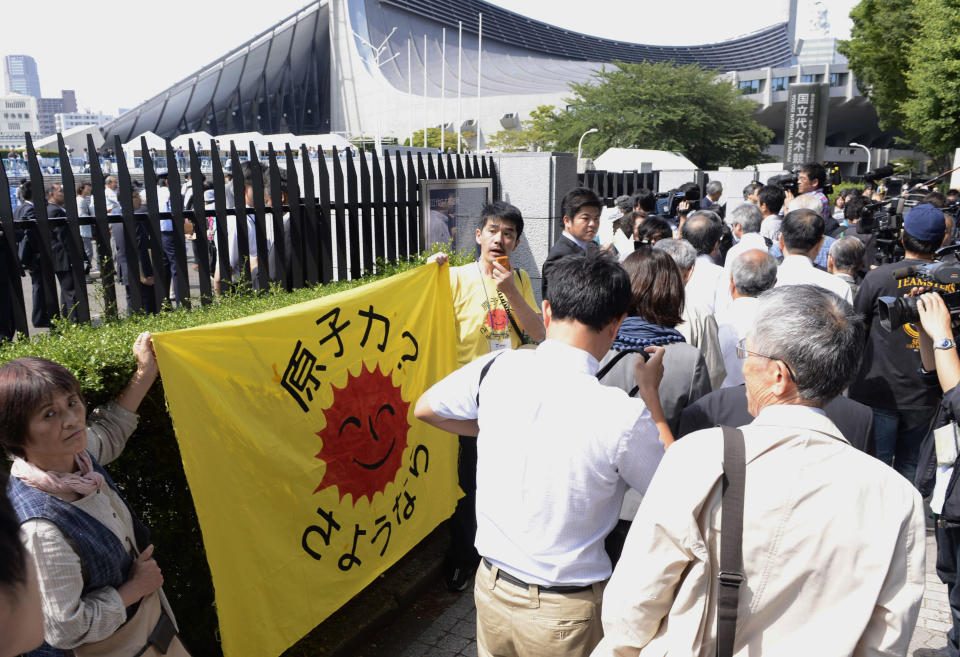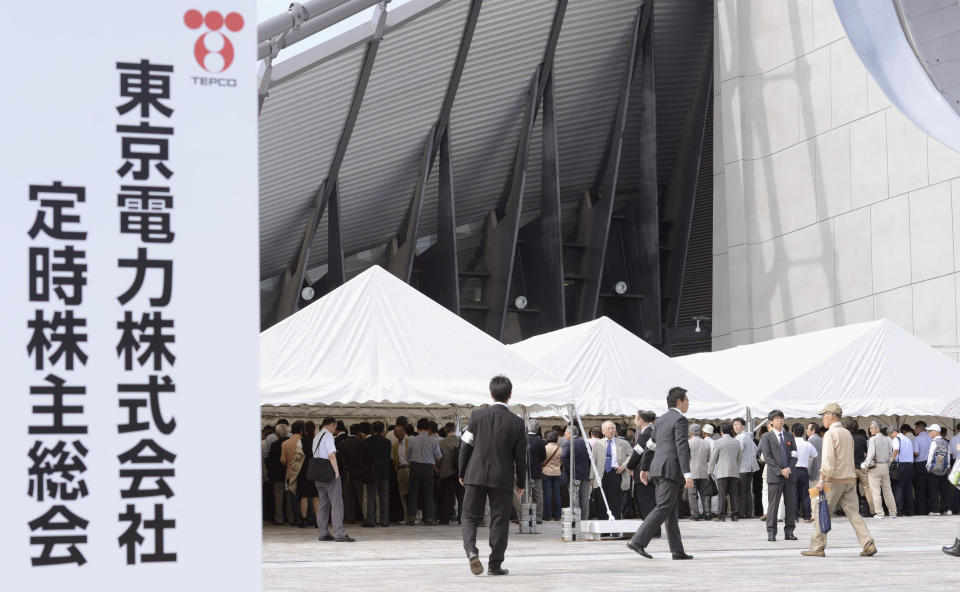Japan nuke utility shareholders approve bailout
TOKYO (AP) — The power company behind Japan's nuclear crisis got support from shareholders Wednesday for a decision to take 1 trillion yen ($12.6 billion) in public funds that effectively nationalizes the utility.
Meanwhile, activist shareholders including the Tokyo city government demanded more restructuring and safety improvements from Tokyo Electric Power Co., which owns the crippled Fukushima Dai-ichi nuclear plant.
Outgoing TEPCO Chairman Tsunehisa Katsumata told more than 4,000 shareholders who gathered at a national gymnasium in downtown Tokyo that the utility desperately needs taxpayer money to avoid insolvency. It faces huge compensation and cleanup bills.
"We are cutting to the bone to restructure," he said, as shareholders yelled at him, criticizing him as clinging to the top post for more than a year after the crisis. Katsumata will be replaced by Kazuhiko Shimokobe, a lawyer who headed the company's restructuring plans.
The 1 trillion yen needed to stay in business brings the total amount of public money injected into TEPCO to 2.5 trillion yen ($30.7 billion).
The meeting also approved the appointment of Naomi Hirose as president, replacing Toshio Nishizawa.
The massive earthquake and tsunami in March last year severely damaged four reactors at the Fukushima Dai-ichi plant north of Tokyo, knocking out cooling systems and triggering radiation leaks. Tens of thousands of people fled their homes in the worst atomic disaster since Chernobyl.
Officials say the plant has since stabilized, but it runs on makeshift equipment, causing concerns about its ability to withstand any major earthquakes. TEPCO officials say it will take about 40 years to fully decommission the wrecked reactors, a huge financial burden in addition to the astronomical compensation payments.
To cover the costs, TEPCO is eager to restart its still functional reactors, including several at its Kashiwazaki-Kariwa plant in northern Niigata prefecture, hopefully next year. A resumption of the Kashiwazaki reactors is a key part of the utility's restructuring plan.
Many shareholders demanded TEPCO make more cost-cutting efforts, and withdraw from nuclear power generation.
Naoki Inose, vice-governor of Tokyo, said the company should fold unprofitable businesses, including a hospital exclusively for company employees and families, to stick to power generation.
"It's not easy to regain trust once it's lost," Inose said. "What the company needs most is to realize it should change."
More than 400 shareholders proposed decommissioning of Kashiwazaki's seven reactors, replacing them with advanced gas-turbine generators. The proposal was voted down, however.
"TEPCO has demonstrated that it is unfit to operate a nuclear plant," said Yui Kimura, one of the shareholders who made the proposal. "Restarting any of the remaining (TEPCO) reactors is out of the question."
Eight other utilities across Japan also held annual shareholders meetings Wednesday, seeking support for the restart of reactors idled for safety checks after the Fukushima disaster.
In Osaka, Kansai Electric Power Co. President Makoto Yagi said nuclear power should continue to serve a key role in Japan's energy supply and that the company needs to restart some of its reactors to stay afloat.
KEPCO is at the center of national attention as it prepares to restart two reactors in the town of Ohi in western Japan. The central government this month approved their startup, saying sufficient safety measures have been taken. Local leaders and many residents around the plant oppose the restart due to safety concerns and lack of emergency plans.
All of Japan's commercial nuclear reactors have been offline for maintenance or safety checks. The government has pushed hard to bring some reactors online as soon as possible to avert power shortages during the high-demand summer months.
Osaka mayor Toru Hashimoto said it's a chance for Japan to withdraw from nuclear energy and switch to renewable sources. He criticized KEPCO executives' complacency about safety.
"I'm really worried about their mentality," he said. "Those executives still aren't thinking about risks."



